#mythological mondays
Text
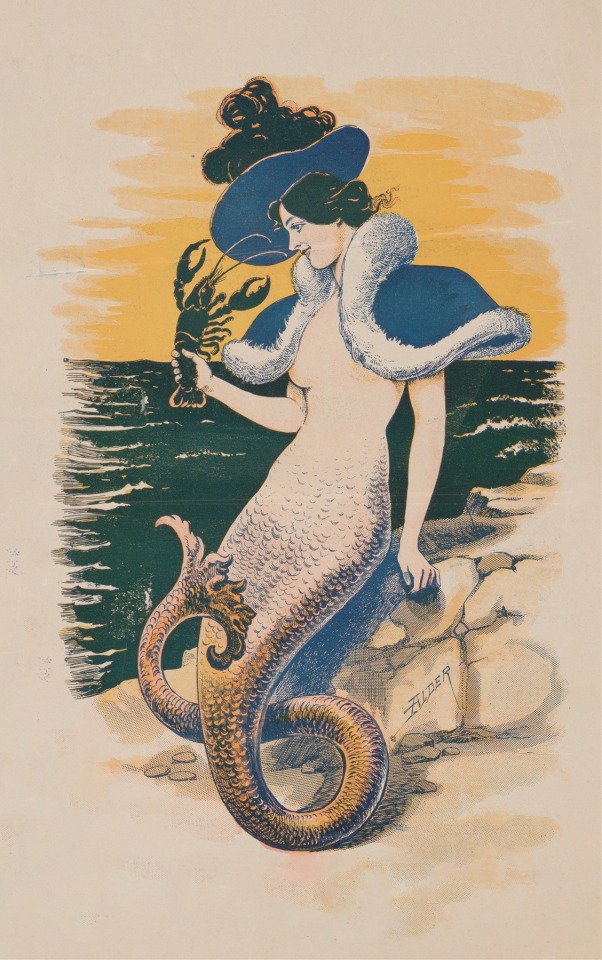
Mermaid is holding a lobster, 1895
Alder
Mermaid Mondays
770 notes
·
View notes
Note
I got a question. Kind of.
So I was talking with a guy recently sort of about red squirrels and foxes and he said something along the lines that they were two of 'what we call the old Welsh animals'.
He kinda said it like it was a thing, like a recognised category in some way. I guess some animals do get grouped together in some of the old stories like stags, owls, salmon etc, so is it just an informal rule of thumb like 'here's the creatures that turn up in myths'?
I haven't been able to find anything online unfortunately. I'd ask the man himself more about it but he's a tricky guy to get hold of so I don't know when I'll get the chance now.
...huh.
I am fascinated to know what he meant by that, because there's nothing obvious I can think of. My best guess is that it's because they're both red? Red hair and dark skin are the two characteristics that mean Very Magic in Welsh myth, and that extends to animals - a red animal is connected to Annwfn. So the hounds of Arawn have red ears, sleeping on a red ox skin gives Rhonabwy prophetic dreams, robins usher souls to Annwfn after death, etc.
But I don't know of any specific tales about squirrels at all. Interesting!
They're both native? Maybe? One of the ways you can check for whether a UK species is native or naturalised is to look at its name in Welsh or Gaidhlig and see which language it was adapted from. For example, in Welsh, "polecat" is "ffwlbart" - a Cymricisation of the Germanic, suggesting they were introduced by the Anglo-Saxons. But "pine marten" is "bele'r coed", a term from Brythonic meaning "cat-like creature of the forest". This suggests it's native. Squirrels and foxes both fall into this native category, and these days red squirrels are super endangered of course; so maybe it's a reference to that?
Or of course, maybe this is referring to a myth I don't know about. Very excited to hear it if so!
92 notes
·
View notes
Text
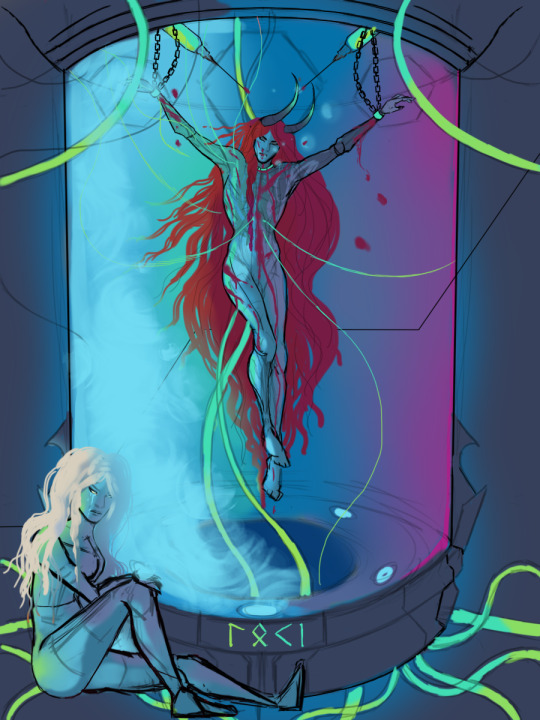
My Gods Are Real Loki Work in progress.
Loki's punishment, and imprisonment for killing Baldr.
Tortured, experimented on, and brought seconds to death only to be revived over and over again by Odin and many of the other Asgardians.
While his loyal wife Sigyn stays by his side.
#norse mythology#mythology loki#loki#loki art#mythology#mythology monday#norse gods#norse paganism#sigyn#norse myth#scifi mythology#scifi art#scifi#science fiction#cyberpunk#dark fantasy#dark fantasy art#comic art#comic book art#binding of loki#digital painting#digital art#gods#illustrator#illustration#digital illustration#comic books#god are real comic#cyberpunk art
86 notes
·
View notes
Text
I find it weird and interesting that so many writers in Norse mythology retellings go with "Hel is totally infatuated with Baldr."
77 notes
·
View notes
Text
For #ManuscriptMonday:

Illustration of the goat Heiðrún from Icelandic Manuscript SÁM 66, 1765-6, housed at the Árni Magnússon Institute for Icelandic Studies.
"Heiðrún or Heidrun is a nanny goat in Norse Mythology, that consumes the foliage of the tree Læraðr and produces mead from her udders for the einherjar. She is described in the Poetic Edda and Prose Edda."
#animals in art#european art#illustration#illuminated manuscript#manuscript#goat#Norse mythology#Icelandic art#18th century art#book art#Heiðrún#Heidrun#Árni Magnússon Institute for Icelandic Studies#Manuscript Monday
24 notes
·
View notes
Text
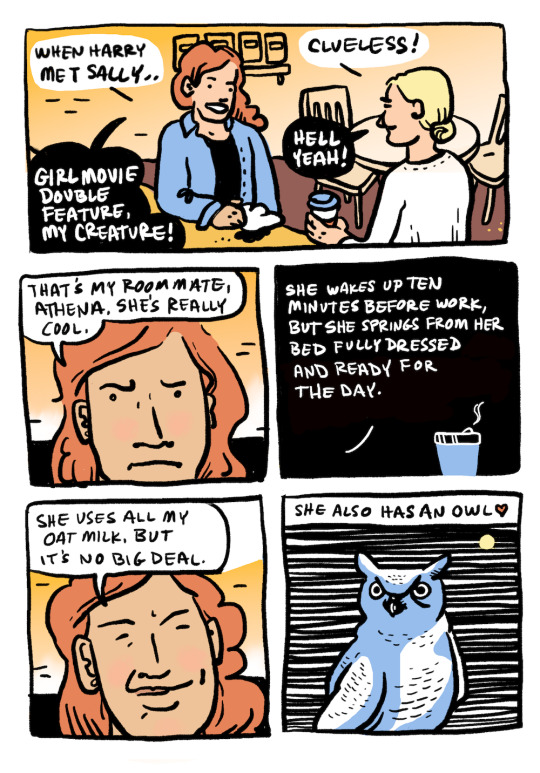
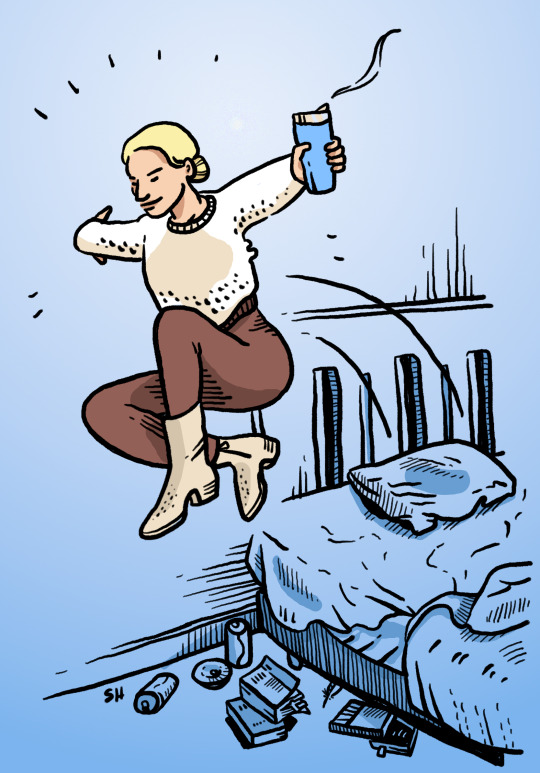
Aurora and Athena, roommates, goddesses 🦉🔥
From web comic Persephone in Hell, re: an indie coffee shop in classical Hades
"Out of the skull sprang Athena, fully grown and in a full set of armour. Due to the way of her birth, she became the goddess of intelligence and wisdom."
—greekmythology.com
Just another Tuesday
#comics#mythology#barista#baristalife#roommates#movie night#owls#classical mythology#greek mythology#web comic#monday motivation#that one friend#coffee shop#coffee#bff shit
77 notes
·
View notes
Text
I really need people to understand that they didn’t not listen to Cassandra because she was a woman she was quite literally cursed. Like Apollo got all pissy over something (varies from version to version yknow mythology stuff) like the gods tend to do and cursed her so that she could tell the future but no one would believe her. It was not because she was a woman like I’m begging you if you’re talking about people not listening to women talk about anybody else-
#hi I’m back and pissed off about greek mythology misconceptions again#with the new taylor swift song I’m just gonna get a little bit mad in advance honestly#also ‘they killed cassandra first because she feared the worst’ no they didn’t#no offense taylor but no they didn’t#trojan war happened trojans won cassandra was taken by agamemmnon as a spoil of war bc he was the literal worst#then they got home agamemmnons wife was not happy so she killed cassandra and then killed her husband for many reasons#shoutout to clymenestra by the way good for her kill your husband girl#absolutely asking my larin teacher for his opinion when I go to school monday btw#madurday night live
8 notes
·
View notes
Text
this post literally is not even funny its just me asking for someone to write a dndads x pjo fanfic
#dndads#dungeons and daddies#like guys can we please#i dont even care what generation i just need it sooo bad#greek mythology is so interesting to me#and uhh pjo kids unite!!#thinking so insanely much about the kiddads and what godly parent they would have#i need at least one (1) hephaestus kid and ir might as well be paeden tbh#i mean i guess i coild do it myself but i start school monday and i honestly cannot be bothered
26 notes
·
View notes
Text
Of burning skies and Morning Stars - The bittersweet case of Sebastian Vettel 2/




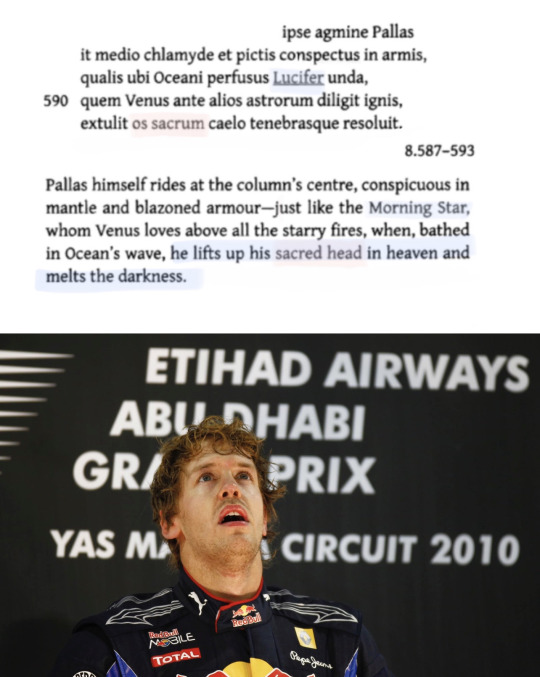



Descartes' Meditations on First Philosophy - Kurt Brandhorst / The Prophet - Khalil Gibran / Michael Schumacher interview / Queen of Peace - Florence & The Machine / Mac Góráin, Fiachra. “THE POETICS OF VISION IN VIRGIL’S ‘AENEID.’” in: Classical Philology 109 / Sebastian Vettel interview (2010) / Antigonik - Anne Carson
#sebastian vettel#mark webber#martian#sebmark#martian monday#f1#formula 1#red bull f1#red bull racing#red bull seb#web weaving#slowly adding the web to web weaving#ah yes greek mythology and f1#a match made in heaven#or hell#^•ﻌ•^ฅWebweaving
40 notes
·
View notes
Photo
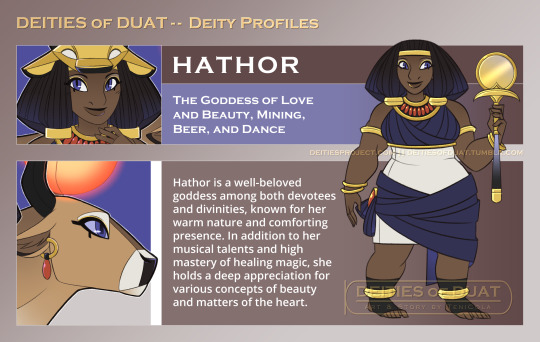
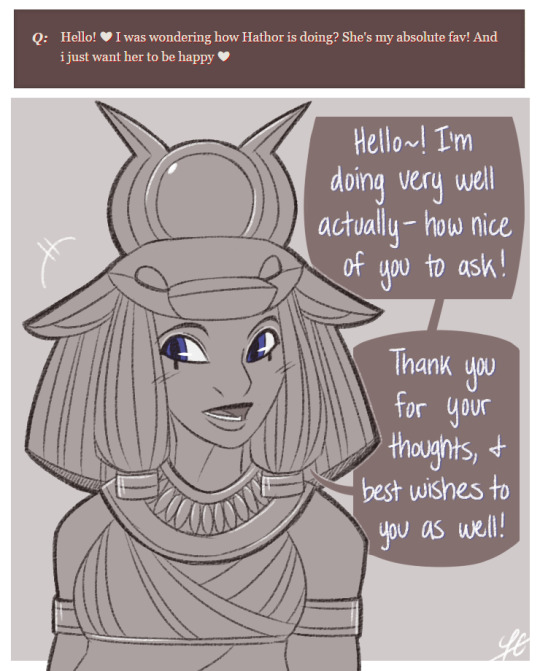



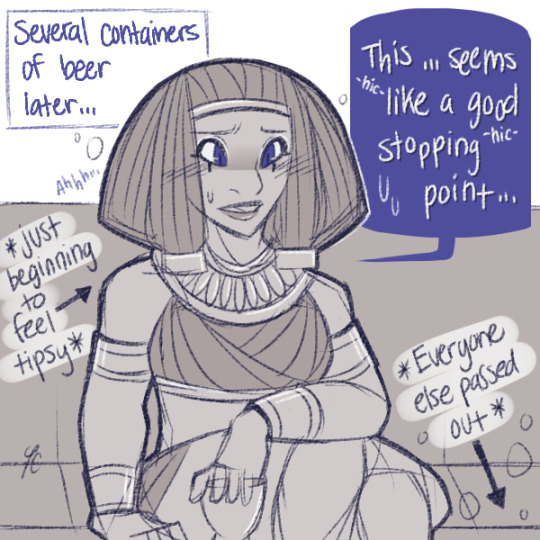
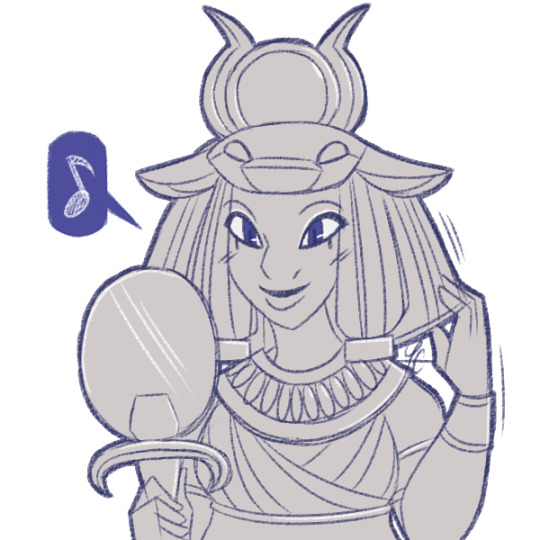
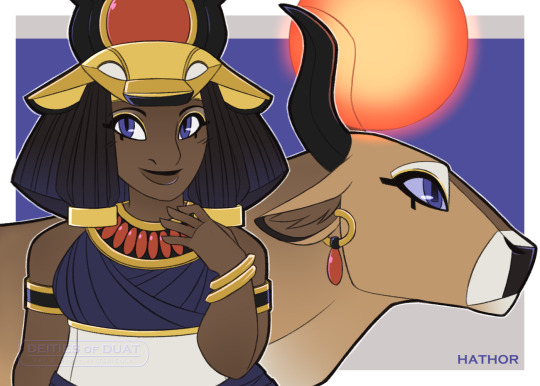
[10] -- HATHOR
✦ TITLE: Lady Hathor -- The Goddess of Love and Beauty, Mining, Beer, and Dance
✦ SACRED ANIMAL: The Cow
✦ DIVINE WEAPON: Mirror Scepter
✦ NOTABLE EPITHETS: "Lady of the Offering; Mistress of the Stars; She Who Rejoices in The Horizon; Queen of the Dance"
✦ PROFILE: https://deitiesproject.com/portfolio/hathor/
----------
Lady Hathor is the daughter of Ra. Her sisters include Sekhmet, Mafdet, Serqet, and Bastet.
Hathor is a well-beloved goddess among both devotees and divinities, known for her warm nature and comforting presence. In addition to her musical talents and high mastery of healing magic, she holds a deep appreciation for various concepts of beauty and matters of the heart.
DEITIES x OC_TOBER -- Deity Profiles [Full Character Lineup]
----------
Another one of Ra's daughters to end the week off! I've only done a bit of development with Hathor, despite her popularity and wide influence in Egyptian mythology, but I adore her character thus far. Hopefully there will be more opportunity to let her shine in the project.
I feel like most of Hathor's fun facts have been scattered across different posts and askbox replies -- such as her singing talents; her relationship dynamic with her other sisters; Horus's long-held crush on her; and the fact that Hathor can easily drink everyone else under the table. So I'm not sure what more to offer at the moment, but that's what the askbox is for, if anyone wants to learn a bit more /o/
#// Speaking of the askbox; I'll return to answering more this weekend -- beginning tomorrow! Profiles will resume next monday#Hathor#Deities of Duat#DEITIES Project#DEITIES Profiles#The Daughters of Ra#characters#deities#design references#cow#horus x hathor#artwork#OC_tober#OC_tober 2022#egyptian mythology#egyptian gods#mythology#kemetic#hetheru#hethert
110 notes
·
View notes
Text
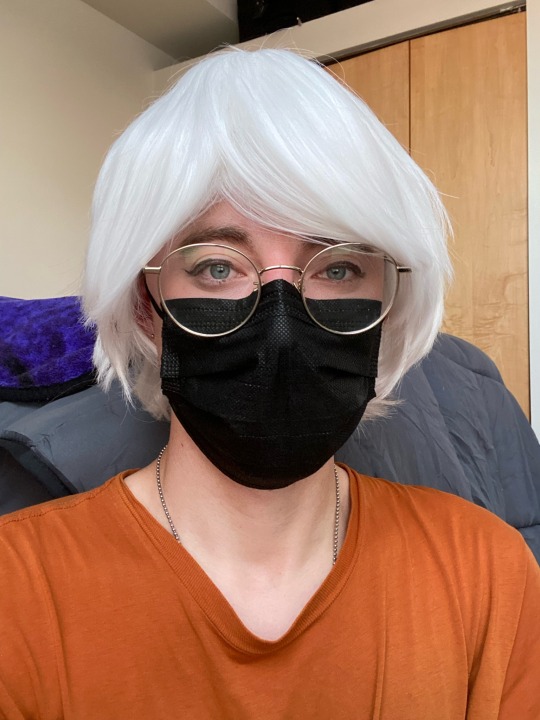

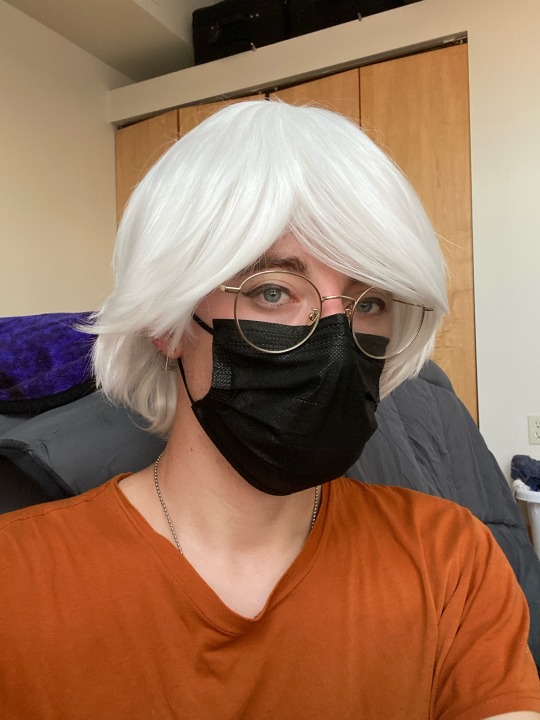
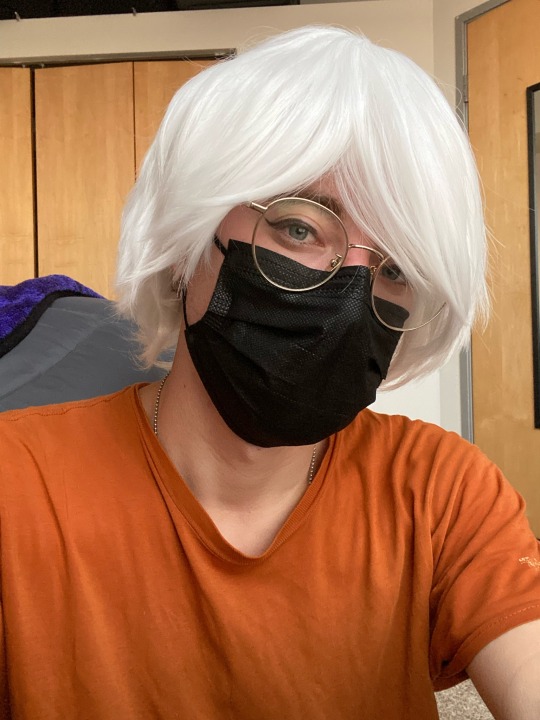
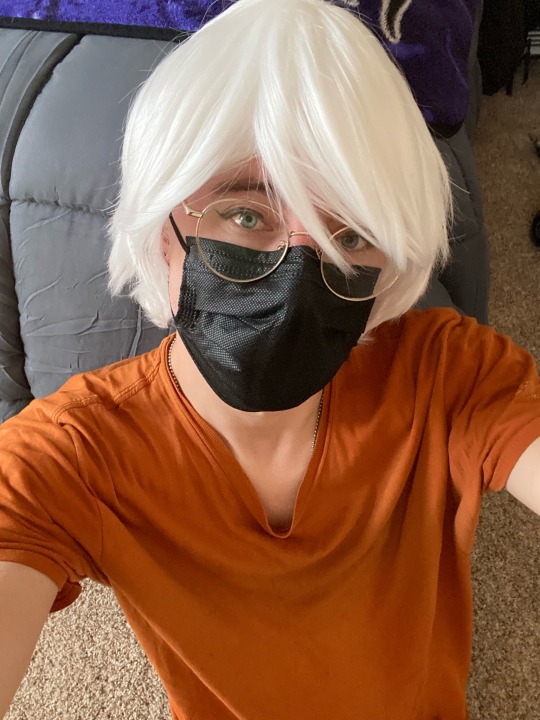
Until i go through the hassle of getting an eye doctor and a contact sizing appt, this is as far as my manga Kaworu cosplay is ever going to get.
#my stuff#yes i know red eyes are like The character trait. yes i’m so mad you need a prescription for cosplay contacts. the FUCK#my face#sparkle on its….monday? are you sure?#i triple promise i feel So Bad posting so many selfies#if it makes me look like less of a narcissist(in like the literal mythological sense) i wont be posting any more for around 2 weeks#if not longer#so yeah. enjoy. or don’t. it’s whatever😘🖤#nge#evangelion#<- adding the tags like a Cosplay Professional lol#white hair
119 notes
·
View notes
Text
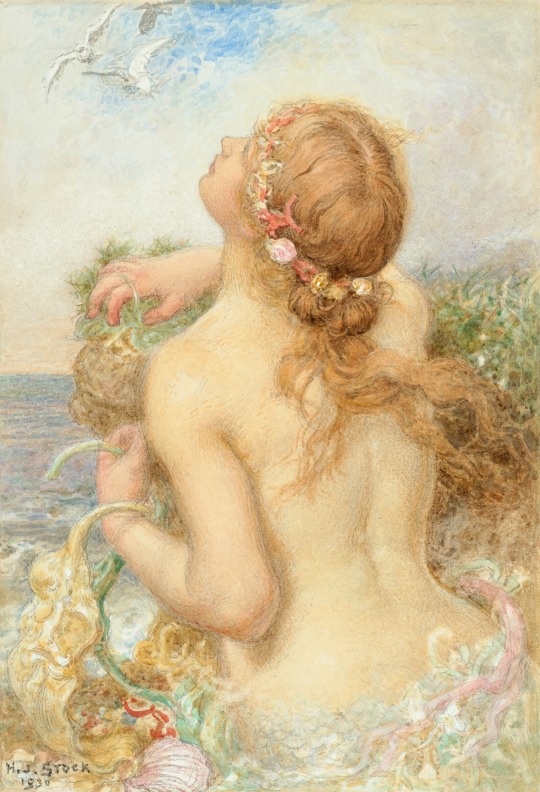
Mermaid rising from the sea, 1930
Henry John Stock
Mermaid Mondays
#Mermaid Mondays#art#painting#art history#portrait#nature#mermaid#mythology#english art#1930s#Henry John Stock
1K notes
·
View notes
Note
"if your surname is Morgan you’re descended from faeries" how does that work
At some point someone called Morgan banged a faerie and they had the kid who was given the ap/erch Morgan surname, and then it became the clan surname, and so the Morgan family now are descended from faeries. Idk I don't make the rules
157 notes
·
View notes
Text
Ep. 4. 'Seasons of Life, Love, & Earth'
Oh lovely and shining Muses, take pity on a poor supplicant begging you for a moment of forgetting. Mortal hearts are easily weakened, and yet, also easily replenished with gentle words and stories. I pray you find this tale I tell, though not the first, pleasing and honorable to you and those glorious Olympians, that you may grant us peace, even if only for a moment. Please, oh radiant Muses, loved by all Gods, I beg you, welcome us into the warmth of your domain, that we weary mortals may forget our sorrows. Let us start this tale at its beginning.
Before, when man was still young and not so far from Pandora’s kindly touch, winter did not come. The Winds blew warm, even when they were fierce, and the Sun shone hot and with much strength under Phoebus’ firm hand. Under that glittering Helios, kindly Kore, sweet and well-loved daughter of Demeter, Lady of Grain, and Zeus, Who Holds the Aegis, gathered with her companions in her mother’s fields, as she often did. They were there to tend the grain, readying it for harvest, but Kore, a Goddess, yet one still on the tender edges of divine girlhood, led them instead, to the many blooming meadows that she loved best; still so filled with the freshness of Godhood was she, that she was often found seeking harmless fun.
Assuring her companions there would be time enough for field work - once they had collected a few baskets of those sweet-smelling blooms - they gathered in those meadows instead. Racing among the lavender stalks, weaving fresh blossoms into each others’ hair, laying in the warmth together, only the soft breezes to hear the whispered secrets between them. That was how Kore and her companions spent their morning.
That was where Hades, that King of the Underworld, saw her first. He was taken by her beauty, yes, but it was the gentleness she showed her companions and servants, and the radiance of her voice, carried to him over the wind as she gathered the other young Goddesses and nymphs, urging them back to the fields to work with her; their fun over, for now, for necessity. This too he admired, her dedication to work in the domain she so loved. He watched her walk away, leaving the meadows she loved for that vital work, a delicate flower behind her ear, and waited to see her cross the footpath up the hill, where she would soon fall away from his sight. She turned, though, as if she could sense his eyes, and he spurred on his horses to Olympus, for despite the helm that hid him away, he worried still that she would see him, and be frightened.
There was business then, between two brothers; one, King of All In and Under the Sky, That Thunder-Bringing Storm Maker, the other, King of All Below the Ground, Ruler of the Underworld. They supped on Ambrosia and wine, speaking without malice or rush in that golden palace of the King of Kings; they discussed new, passing strife caused among them by the dealings of mortals, personal affairs within their own domains, how best to navigate their expanding kingdoms - speaking as Kings do well into the Sun's trip through the sky. Their business concluded, though, Hades took that King of Gods’ hand in his own, pressing his forehead to it before he began to speak. “I saw Kore in the fields today. She shines, though, in those meadows of her mother.” And Zeus, who took quick notice of Hades intention, raised a brow.
“You have not wanted for a wife before. You know Demeter will never allow her to go.” And he let loose a small laugh, though it shook the floor in its might.
“I believe she could be persuaded - I am not a horrible match,” and Zeus agreed, he was not. “You know, as she does, never would I dishonor my loved brother and sister. If you would grant me the chance, I would honor your daughter the same. I would make her my wife, and my equal. It would be her choice to remain.”
Pondering his brother’s words, that glorious Sky Shaker appraised him carefully. “You will have to take her as some mortals take their wives - under her mother’s and companions’ noses,” and then he sighed, leaning forward in his seat. “I will give my blessing - though I urge you - let no one see you when you go. Take caution.” They spoke more easily then, leaving business behind and settling, as they always did after their semi-regular meetings, into their roles as brothers confiding in each other.
Upon his return to the Underworld, Hades wasted no time in planning the taking of his wife - though she did not know that she was yet to be so - and enacting those plans. He worked ceaselessly, erecting chambers in his palace for her, separate and more ornate than his own, with what he could only hope would be comforting imagery to remind her of the overworld; fine paintings and carvings of his sister’s meadows, the sun, the moon, that young Goddess’ own companions of delicate nymphs, though they paled for him when he thought of her. He filled these rooms, then, with finely woven rugs and blankets, tapestries to throw out atop lounging couches and stools, furs and other soft things to ensure her comfort tucked safely into large trunks and chests of carved stone; he had a fine wooden wash tub brought in, trimmed in ivory and silver, and settled it close to the hearth of the room, blocked by ornate, golden screens. He had trusted servants bring in many goods, serving bowls of shining bronze and tripods of gem-studded gold; he filled proud-standing shelves with sweet smelling oils and soaps for her, made of only the finest ingredients; shiny things to lay in her hair and carefully crafted dresses and robes, like those his own sisters found pleasing. There was nothing within his reach he would not offer her.
His preparation of her chambers complete, Hades moved next into his own great hall, tasking a skilled craftsman under his rule to build a throne for her beside his own. It was made of the same heavy, dark stone, and inset with finer jewels than were on his own; detailed in gold and silver, he took liberties to have it adorned with images that he thought would be more pleasing to her. Though the seat itself was smaller, to suit her smaller frame, the rest was equal in size to his, and he felt satisfied it would impose on supplicants the same heavy weight of her station as his own did; for he intended for her to sit always beside him, to rule as his queen - an equal holder of his lot. He had finer drapery set up on the large arches, instructed other servants to clean and polish the dark stone so that it might gleam when her radiance shined on it; he brought in finer tables and couches and cushions for her, should she wish to lounge beside him and take their meals together here, in those rare moments of peace where mortals rested from war, and the stream of shades slowed to a trickle of only old men and women, ready for peace.
Finally, finding a suitable place within the bounds of his palace, Hades planted and urged many lovely things to grow in that deep soil, seeking aid, in secret, from his grandmother, that unyielding and powerful Earth. And Gaia made the soil soft and fertile, so pleased was she with his efforts to court the Goddess, and wanting to aid her grandson’s happiness, she told him all the care that would be needed, with no Sun or wind to strengthen them below. From his hard effort, many pretty things took root and grew well in these gardens - fruit-bearing trees, and lovely flowers, and thorny bushes of sweet smelling buds. He chose a trusted man, Ascalaphus, to help him tend the gardens he brought to bloom until the time came when they could be handed over to their intended Mistress.
Ascalaphus was son of the river God, Acheron, who himself was trusted by Hades as the first barrier for mortal shades, and who always had whispers of overworldly dealings for him, for Acheron flowed from the overworld to below, and heard much news of the mortal world from their whispers by his banks. These gardens were watered by Ascalaphus with his father’s freshest currents, kept clear and untainted by the woes of mortal shades, snagged by the waters as they attempted to flee their fate. Loyal to his lord, Ascalaphus was pleased to be given such a task, and enjoyed the garden so much he spent also his free time there, ensuring each root and bloom thrived; and, loyal to that King of All Below, Acheron was pleased to have fresh life below for his master, and a station for his son to fill beside him.
His home now set to receive her, Hades waited until Dawn had risen, and Helios began his trek across the sky; he peered up through cracks in the ground, awaiting the sound of her footsteps and the sweet noise of her laughter. Then he heard her soft voice, and the voices of her companions, some distance away from her, and acted swiftly. Taking hold of his helm, he summoned his chariot and emerged from the Earth before that young Goddess. Her companions, nymphs of the surrounding meadows and fields and forests, ran, frightened by the sudden noise and appearance of a God, but Kore did not flee; peering up at him, she saw his hand reach out, and thinking he meant to grab hold of her, she became curious when, instead, he held it for her to take.
“You know who I am.”
“I do.” She said. Her voice sounded like song in his ears.
“We must go swiftly, if we are to go at all,” he said. “Your companions will return, and your mother will come, and they will stop all this.”
“And what is all this?”
Hades looked down at her, a young Goddess, faced with the King of the Dead, showing no trace of fear, or doubt or worry of his intention. “Your father has agreed you will be my wife. Do you agree?” Kore didn’t know why he was asking her thoughts on the matter. She set her fingertips against his palm, though, hesitating at the last moment, but unable to pull away when he held her, firmly but gently, and pulled her into the chariot beside him. In her shock, though, at being lifted with such strength and force, and yet also such care and grace, she let out a startled cry, alerting other nearby Gods to the happening, and Hades urged his horses faster, guiding them quickly back down to his lovely domain, handling the reins with ease and holding her close to him with the other hand. “Have I frightened you?” He asked, when they arrived, servants coming to take the chariot and horses from him.
“I was only startled. Someone may have heard me.”
“I am sure some God did, yes, but you are here now, and there is little they can do,” he swept a hand across the plain in front of her. “Your palace, my lady. But first, small gifts for you here. Come see.”
And Kore was shocked, for he did not call it his palace, nor even their own to share when she became his wife - but hers, and she grew weary at the silver of his tongue; but still, she had taken his hand, and though she did not truly know him, for he was often far from her view even during gatherings and feasts of the Gods, he was still her father’s kindly brother. She followed him, looking with curious eyes at the dark warmth of the Underworld, which she had never seen before. He swept through large stone archways held by thick, sturdy columns, and she stayed close in step with him, made nervous by the differences of their worlds, even as she admired the craftsmanship of it.
Hades brought her first into the gardens, watching eagerly for her reaction to the bloom he’d brought below for her, and he saw also with kind heart that Ascalaphus had put much effort and love into it since he’d left the task to him. “Flowers and blooms like this bring you joy, do they not?” And she looked at him, her eyes wide and mouth parted in gentle question, before turning back to take in the lovely garden, tall orchard trees bearing many kinds of fruit, leafy vegetation flourishing in a place she was sure it could not. “I… assumed it would bring you comfort here.”
“It is most generous, I thank you,” she dragged delicate hands along those leaves, her palm coming to cup a pomegranate, nearly ripe. “These are edible?”
“Yes, but I caution you - they were planted and grown here. Everything in this garden is of our domain.” That lovely Goddess could barely suppress her shock - again, he was offering her his own portion of the lot of the world - while telling her plainly that if she did not wish to stay, she should not eat of those trees. Kore nodded, for she understood. Squeezing the firm fruit, she released it, watching as it bounced lightly on the branch before settling again.
Gently offering his arm, Hades felt great joy and pleasure when she took it and allowed him to lead her through the palace to the great receiving hall. Her eyes fell immediately on the two thrones, equal in size and disposition to each other, save for the smaller and more delicate, plush seat of one; her heart moved, she turned her face up to his, taking in as well the careful decoration and lovely things inside. “Two thrones?” She would not ask outright. Let him say it.
“For you,” he did not hesitate, and led her through the large hall to stand before them, gesturing to the throne with the finer seat. “I had the detailing done in a style I thought you would find more suited to you, and I instructed the craftsman to make the cushion fitting for a Goddess of your standing. It is otherwise the same as mine. Does it please you?” He peered curiously at her, worrying over her reaction and what she might make of it. Perhaps it was overwhelming.
“It does please me. Thank you.”
“You need not thank me.” And he meant it.
They walked the palace grounds and spoke in low voices to each other, asking and answering questions about their Godhoods; her early thoughts on the Underworld; his thoughts on asphodel flowers. He felt the last of Eros’ deadly strike sink with finality into his heart, and felt that gentle and tender love grip him so tightly he thought he might choke from it. He paused in front of the large wooden door that would bring her to her chambers. “These are our rooms, then?” She asked, worry and fear beginning to fill her chest; she was a Goddess, but one who had not before laid beside a man nor God, had never shared furs and linens with anyone but her mother and her girlish companions. He would make her, she feared. It was not an entirely unpleasant thought, but one that reminded her of why she was here.
“No, they are yours,” and Hades waved a hand to open the doors, and pulled himself morosely from her side to allow her to enter without him. “You may share my rooms, if you’d like. But these are yours alone. There are many chambers within for you, please, do as you see fit. My servants are yours, and they will help with anything you wish.” Kore felt the prick of the Arrow of Love when it landed in her own heart, and knew that it would only grow when she turned and found him waiting still on the threshold of the chambers, leaving her alone in her space. She took note of the finery, the careful craftsmanship and effort, each detail set about the room with so clear an intention, she knew instantly it was, through careful thought by him, for her. She had thought, when she thought of him at all, that perhaps he was cold, or distant, or unfeeling for the rest of the Gods, this King of Jewels, Lord of the Underworld, hidden away always in the ground; a blossom which refused to bloom. But he was not. He was tender and kind and thoughtful, a reserved warmth evident in all that he had done. To have her. To encourage her to have him. She knew she could love him, easily.
Returning to his side, she smiled pleasantly up at him, and bid him to show her the rest of his domain. They walked, and spoke at length about his duties there within and below the Earth; what he wished for her to do; what was needed and what could be changed. They spoke also of the marriage, and when they had returned, they sat at those lovely low tables in the great hall to lounge and drink the Ambrosia that gives Gods nourishment, she agreed that she would stay, and be his wife and his queen.
While Hades and Kore supped and whispered sweet plans together below, Demeter traveled quickly across her domain to the place she heard her daughter cry out; and having mistaken it for fear or pain, she felt worry and terror claw at her when she found that the meadows were empty. Except for those nymphs, companions of Kore’s who would or could not help her, for they fled before they could see truly what had come and stolen her away, or from where, and were afraid of upsetting some more wrathful God. Angered at their defiance and fear, Demeter cursed them, turning them into the first of the Seirenes - bird-women with beautiful songs and cruel appetites - and banished them far from her fertile lands. Throwing off her lovely veil, she donned her cloak and left those fields and meadows behind her, searching tirelessly for anyone who may have heard her daughter.
On Demeter went, searching the wide Earth for Kore, stopping not for food or drink or rest; at night, when Ouranos darkened the Heavens and Skies, she wept and wailed, unable to continue her search in the dark. For nine days, restlessly she searched, until Hekate, sweet and lovely Goddess of Magic, came down to meet her as Dusk crept over the Earth, her torches blazing brightly. Greeting Demeter kindly, and knowing she had worked tirelessly and traveled many miles, Hekate told her that she too had heard Kore shout, but knew not where she now dwelled, and replenishing their strength on Ambrosia, she pulled Demeter back to her feet so they may continue the search together, path lit by those blazing torches.
Together, Hekate led them to Helios, that blazing, primordial Sun-God, who sees all lit by him as he drives across the sky; it was night when the two Goddesses came across him, though he lit his space with brilliance, and so he was free of duty and free to speak. And speak freely he did.
“I heard her cry, and saw her taking,” he poured out Ambrosia and set a fine table of gold for them. They ate together, resting on lovely pillows and furs while he told all he saw. “I do not believe it was fear that made her shout, though I could not see closely - she put her hand in his quite willingly. I saw too, the agreement that Stormbringer struck with his brother, Lord Below; he would make a fine husband for that comely daughter of yours - he is fair and just, and I do not doubt he would treat her well.”
“She is in the Underworld?” The news struck Demeter’s heart and filled her with overwhelming grief.
Helios confirmed her question. “Yes, and by decree of her father, she is to be wed to Hades - though, I cannot say whether the marriage has already taken place - I cannot see below, in that realm, as my rays do not shine quite so deeply,” he laid gentle hands on Demeter’s. “Do not worry yourself so, cousin. Your brother’s heart is kind, though he is often dour at feasts - it is my own belief that he is just not quite as interested in merrymaking as the rest; to Kore’s own benefit, I would think. A handsome God with his own sprawling lot, who holds no interest in parties and has never before sought a wife - he will make a fine son-in-law for you, if gossip is to be taken as fact.”
But Helios’ words did not soothe Demeter, for the loss of her daughter drove her wild with longing and fear. She knew well that her brother was kind and just and tender - though Helios was right, that he did not feel well-suited as the rest of their siblings were to the bright light and merriment of Olympus, and that his serious, hardworking nature certainly boded well for any wife he might take - she wept for the loss her own daughter would suffer below, losing sunlight and flowers and all the sweet things that Kore delighted in.
Taking no comfort in the company of family, however distant, and with her fears now sure and confirmed, Demeter rose suddenly and swiftly and departed from Helios’ palace; she came down to the Earth again and vowed she would have her daughter returned. She tightened the firm hold she had of the fields and their grains and the meadows and their fruits and blossoms to smothering effect, and knew that soon all would die, for she held so firm to her lot that the Sun too could not reach the Earth. Clouding her true visage from mortal eyes, she wandered as an older woman from city to city, traveling from mortal town to mortal town, despondent and sorrowful for the loss of her daughter to a realm she could not freely enter. For many weeks she walked, without rest or food or drink, ignoring prayers and offerings, until she finally came to sit below the shade of a tree on the border of a small city.
As she leaned against the tree, her eyes wandered to the footpath where many young children and girls and women walked by her, offering smiles and kindly glances, but who did not stop, for often they were merchants eager to sell wares in the city. She paid them no mind, taking no slight in their ignorance of her nature - mortal hearts are often blind to Gods. The sun was high in the sky, though little warmth shone from it, when soft and gentle hands disturbed her. Four young women, of lesser fineness than her daughter, but filled with the same sweet innocence that made Demeter’s heart ache, stood before her, looking down worriedly at her.
They each held large pithos perched atop their heads, carefully balancing the jugs, clearly full of water. “We saw you on our way to the well, and still you are here. What is your name? And why don’t you join the other women safely in the city? Surely it cannot be right for a woman of your age to be alone along such a path.”
And though Demeter knew she was safe wherever she was on Earth, especially from mortal hands, she felt touched at their concern. “I am Doso, of Crete. I was captured many years ago by pirates, but fled and have traveled far to be here, wherever this may be, for I do not know what great city this is,” and she smiled fondly at them when she saw the pity in their eyes for her tale. “I wish you many blessings, fine houses and husbands, and healthy children, for you are the first to show such concern for a poor woman by the roadside. And what of you? Your names and houses?”
“I am Kallithoe, the oldest of my sisters. They are Demo, Kleisidike, and Kallidike,” the girl crouched beside her said. “You are just outside Eleusis, where Keleos rules.”
“Help me but one more time,” Demeter asked, and the girls agreed. “Would you know any families looking for a nurse? I seek employment for my stay here, and a hospitable place to lay my head. I have much experience with new babes, and hope that some noble woman might welcome my help.”
At this, Kallithoe brightened, for her own mother was looking for such a nurse. “There are many families who would offer you the hospitality you seek,” she hesitated for a moment before continuing. “But our own mother, Metaneira, wife of Keleos, seeks a woman such as you to help with our brother, Demophon - he does not sleep, nor does he take food without struggle, and often he cries until he cannot any longer. If you would wait here, we will bring this water back and ask her, and then return here to you.”
And Demeter agreed, she would wait, and watched with tender heart as the four young women ran quickly back up the footpath. It was not very long before they returned, winded and with flushed faces, but they greeted her with joy and care as they helped her to her feet. “Our mother has agreed, and offered you any wage and luxury, should you be able to help our brother. Though grief clung tightly to Demeter, she found some small comfort in the girlishness of the mortal princesses who guided her through the city, their chatter unceasing and yet pleasant still to her.
But as they approached the fine palace of the princesses' father and mother, Demeter felt sorrow well up again in her chest; as they brought her across the threshold, she hid her face in the veil of her cloak and wept, unable to bring forth words. It was only Iambe, a humble servant to Metaneira, who understood what it is that is truly needed; and so she set a fine and sturdy stool down for her, and settled beside Demeter to tell the jokes of her own people. These jokes, often overheard by the Goddess from the men and women who tend her fields, brought to her a familiar comfort, and that was how Iambe turned the Goddess’ mood and brought small joy back to her. Still today, it is Iambe who comforts and brings laughter back to Demeter’s halls in the winter.
Supping together with Keleos and Metaneira, she listened to the complaints and fears for their son, who was small and sickly, and rarely soothed; she asked only for a comfortable room, and meals to nourish her, and swore she would heal their son. Small Demophon took quickly and easily to Demeter, who doted lovingly on the infant as if he were her own son; in the quiet hours of the night, she fed him droplets of Ambrosia from her finger and laid him to rest among the coals of a Holy Fire in her own hearth, brought down from her own domain upon Olympus. Quickly, Demophon grew tall and strong, and clung tightly to Demeter, for few mortals know what it is to be reared by a Goddess, and so too did her own fondness for him grow; she would have made the boy immortal, so deeply she loved him, if Metaneira had not seen the Goddess set her son in the glowing embers of the hearth, and offended her with a scream of anger and fear.
Throwing off the cloak, that radiant Goddess revealed herself to the Queen of Eleusis, her anger such that it shook the halls of the palace as she told Metaneira of the fate she had deprived her son of; and Demeter felt her own heart ache with the knowledge that the sweet boy she cared for would meet the same end as all mortals. She instructed Metaneira, who had laid herself in fear and sorrow at the Goddess’ feet, to build her a temple there, so she may find Satisfaction at the woman’s disrespect, and that all Eleusians may receive her blessings, so truly did she love small Demophon. Keleos, hearing of the news before Dawn the next morning, worked quickly to gather the men and supplies to build the temple, and made a fine place for that beloved Goddess of Grain to call her own, hoping it would be enough to soothe her ire at his wife’s offense. The temple built, Demeter returned from her wanderings of the Earth to Eleusis, occupying the sanctuary and filling it with her holy light and presence.
She continued her steadfast shunning of those Gods, still heavy in her grief and anger at them. Now, the Sun did not shine as it once did, and the granaries of men began to empty. As the days passed and grew in number, the prayers of mortals grew also more desperate - there was no wheat to harvest, and no seeds would sprout against the frozen Earth, and they had not planned for the fields to yield nothing; the winds were harsh on them, and Helios’ warmth could not reach them where Demeter’s influence kept the Gods at bay. She allowed only Boreas, who blew with a biting chill to soothe Demeter's hot anger, to swell and run along the Earth. Hearing their pleas and feeling misery in his heart for those well-loved mortals, descendants of Pandora, who all the Olympians love so tenderly, Zeus sent first Iris, his sweet wife’s own personal messenger to Demeter, asking her to hear the suffering of the mortals she loves.
Iris returned to Zeus, telling of her inability to sway, or to raise a response from the Goddess, so deep in the throes of her melancholy. Then, that radiant Aegis-holder sent each of the Olympians to her Temple of Eleusis, pleading with her to allow sprouts to push through the hard dirt, so that wheat might take root and flourish again - each God after telling her how the men of Earth starve. Each was sent back in turn, declaring the same. “She is deaf to mortal suffering, for her own is far too great.”
Desperate to ease the suffering and silence the prayers of hungry and dying mortals, Zeus turned finally to fleet-footed Hermes and bid him go down to the Underworld and bring Kore back; marriage talks must wait until the force of cold and rage and grief settled in Demeter’s heart, until, at least, she released the chokehold she had on her domain and freed again the fruits of the Earth. And that youthful God did as he was bid by his King, and flew swiftly with his lovely winged sandals down to that domain below, awaiting an audience for that Ruler over the Dead.
It was Kore that welcomed him in, settled him at the fine low tables with wine and Ambrosia, and greeted him warmly. “A welcome surprise, brother, for I see you often passing through these halls, but rarely do you slow enough to speak,” she said. “There are more shades as well than is typical.” And they both heard the message that was unsaid in her words.
“Sweet sister, our father and King sends me to bring you back to the surface - better, to Olympus, to urge your mother back to the Godly home she keeps there,” he did not hesitate to drink, though noticed she did not, for this wine was of the Underworld. Hermes, ferrier of the dead, belongs to all worlds, and fears not the ties of the King of the Dead. “She drives about cold winds to hold the Sun’s warmth from the ground, and many mortals freeze, and starve. She is full of despair at your… condition here.”
“My condition is most relaxed, I assure you,” and she told Hermes all that she had seen, and learned, and of the kindly way that King had treated her. “Though, I do not believe you will be able to return without me.”
Hermes set a gentle hand over her own, and cradled her hand in his palm. “Not without much strife, I fear. The mortals are dying. No field has given crop, no trees bear fruit, no bushes put forth berries, or nuts, all the bees even sleep, or die,” he stood and bowed respectfully, as Hades had come to join them, settling carefully at Kore’s side. “King Zeus demands Kore’s return, I am here to deliver that message, and ensure it is done. I will leave you to discuss.” That God of Heralds turned then, and flew from the room, looking for some lively shade or nymph or daimon to occupy him while he waited.
Hades rested gentle fingers along her cheek, brushing back her lovely hair and tracing the curve of her pretty face. “I told you it was your choice, I would not hinder your leaving.”
“And if I wished to stay?” He smiled at her words.
“Then I would plead my case to my sister, so dear to my heart, and win her over.”
“And if I wished for what my brother has, to come and go, to rule here with you and still see the Sun, and the flowers above. What would you say then?” She asks.
“If such a thing I could grant you, I would, and would only ask that you return, and be my ever-faithful wife, as I would be your ever-faithful husband.”
She took a moment to think, then, before she nodded and took his hands in hers. “I will be your wife. I can promise my return. You need not trouble yourself with pleading, for I have a plan.”
He kissed her fingers. “I am eager to witness your mind at work, though your departure brings me great sorrow. Your domain and your throne and your fine things will all be waiting for you. As will I.”
“This will make much less work for you.” She said, and then stood, moving quickly through the palace towards the gardens.
When she crossed under the looming threshold, her feet leaving polished stone and finding the rich soil of the Underworld beneath, she walked deliberately through the trees, looking for the fruit most suitable to her plan. Plucking a pomegranate from a low-hanging branch, she knocked it against her fist, loosening the seeds, and split the skin with her strong hands, juice staining her lovely fingers as she plucked out six seeds. Food of the Underworld will bind you to it, but perhaps it could bind her the way it bound Hermes, if she brought together this domain that would be hers, and the one of her mother’s above.
She did not hide her actions from Ascalaphus, who stared with wide eyes as she ate each seed in its own turn, instead meeting his gaze and grinning fiercely. That loyal servant to Hades, moved so by his Lady’s actions, moved with quick feet to seek out that Herald, to deliver the unspoken message of his Queen into his ear, and the two took private delight in the quick wit and cunning of that lovely Kore.
Following Ascalaphus slowly, Kore took a long look at the domain that was offered her, and felt yearning in her own heart. She would miss the palace, and the gardens, and the Underworld itself - and she would miss its King most terribly. Resting a hand in Hermes’ own, she allowed him to help her into a fine chariot made ready for them by servants of Hades, detailed in the same fine gold and jewels that adorned all the things he’d given her. She felt a deep melancholy swell in her chest when he kissed her fingers goodbye, stepping back heavily to allow that God of Thieves to spirit away his Goddess of Flowers and soft things from him.
They arrived quickly at Olympus under Hermes’ skillful charioteering, and he left her in the tending hands of maids and servants as he flew again to Eleusis to tell Demeter of her daughter’s return. Made light again by his words, but still wary of trickery, she soon made her way to her Heavenly palace, finding her daughter again within its halls, safe and protected.
“My sweet girl,” she said, clutching her close to her chest and weeping as only a mother can for their child. “Was it terrible?”
“It was wonderful,” Kore replied, clinging just as tightly to her mother. “Though I missed you, I will not lie to you. He is kind and fair and just, and I wish to return and be wed to him.”
And Demeter gasped in shock at the idea, so certain he had tricked her. But she had raised and guided Kore well, teaching her all the things a Goddess should know, and knew her daughter was no fool. “Did you eat there?”
“Yes, of my own choice. Six seeds of a pomegranate grown below. He grew me a garden, mother,” and she told Demeter of all he offered, and all he gave, and all the kind and gentle ways he proved the truth of his heart. “Why should the fields and the fruit and the flowers live eternally there when mortals wither and die? All things of the Earth must die, but each season after the harvest, the stalks of grain are grown again, and the trees bear more fruit, and flowers sprout easily. I wish this for my domain, that the things of your own lot would live and die with me, that I may keep you and my husband both.”
And Demeter, as all mothers, divine or mortal the same, wept for her child now grown and changed, but not of grief this time, only soft longing for the girl who had become now a woman. “I will grow nothing while you are gone. The mortals will starve.”
“They will learn to store more, and be wise with the gifts you give. I will return to you after six moons, and share six more with you before my return - one for as many seeds as I ate. We will nourish the Earth back to bloom together.”
“I will make the winds blow cold, and block the warmth of Helios.”
“Then let us call these Seasons, and let them follow the mortal cycle of life and death in this way too, each of those four winds portioned out.”
“I will miss you.” Demeter said finally, for that was the truth in her heart.
“And I will miss you. But I am no divine child any longer, now I am a Goddess grown,” and she took her mother’s face tenderly in her hands, and pressed soft kisses to her cheeks. “Be happy for me, sweet mother. A great King would have me for a wife, a kind and just one; he would share half of his magnificent lot with me, and be my faithful husband.”
Demeter felt the pang of loss within her, but could not argue against her daughter’s claim. “My wise, beautiful daughter, you are the pride of my domain.” And taking her daughter’s hands tenderly in her own, she pulled her to counsel with the King of All Gods.
Together they went, and that Sky-Shaker heard the plan that Kore and her shining mother had set and agreed, and pride filled his chest at the wit of his lovely daughter, and tenderness too took hold of him at the sweet things she told him of his own brother below. He declared it so, that she would be of both worlds and stay in each for six moons; six to tend the planting and fine burgeoning of the Earth each season, six to mind the domain shared with her husband. He called her then Persephone, a fearsome epithet for his cunning daughter. And Hekate found Persephone and held her tightly, filled with joy at her lot, for she loved this girl and loved her mother, and loved also that King of the Underworld, where she spent much of her own time; and that fine Goddess of Magic and Crossroads promised to Demeter that she would guide and protect Kore as her own when she was below, and hold fast her position when she returned above.
And this is where our seasons come from, from grief and love, life and death. All things born of this Earth must die. Shades delivered kindly and tenderly into the hands of those merciful Gods below when the mortal body fails, but returned to the surface anew when the Lethe wipes clean from their hearts and minds the miasma of the life last lived. So too must all those lovely things under Demeter’s gentle hands wilt and fade when her daughter makes her descent; but they also bloom again each year, given life anew at the firm and kindly hands of that clever and fearsome Persephone, Daughter of Life, Queen of the Dead. And each year on her arrival back to the Overworld, mother and daughter both delighted in seeing mortals trek to meet them for their reunion, and offered secrets to them when secrets were kept, though those Mysteries of Eleusis are kept now from the lost and wandering mortals of today.
May this tale please those glorious and radiant Gods above and below, and so too may you be pleased with my words, sweet Muses; it is by your hand that my soul is refreshed and my mind made forgetful of mortal sorrow. I pray you come again to whisper more lovely things into my ears, and settle your hands once more over me to guide my tales, that we may all come together in the forgetting, that we may all leave lighter and holding hope close to each of our hearts to find peace in the generosity of the Gods another day.
#text post#episode#episode 4#faith#greek mythology#greek mythos#mythos mondays#pagan religion#religion#roman mythology#original writing#Zeus#Hera#Hermes#Kore#Hades#Persephone#Hades and Persephone#Demeter#Seasons#Helios#Hekate#the first day of Spring is tomorrow and its been far too long since i posted one of these
3 notes
·
View notes
Text

TV Tropes, I am begging you to find out why the number twelve might be important in Judaism/relevant to the Jewish people in Jesus's time.
Spoiler alert: it's not because of Greco-Roman mythology.
[From "Hijacked by Jesus" article.]
19 notes
·
View notes
Text
For #MosaicMonday, here is Diego Rivera's (Mexican, 1886-1957) 1956 Exekatlkalli mosaic on the façade of La Casa de los Vientos (The House of the Winds, home of Dolores Olmedo) in Acapulco, Mexico. It was one of his last great works before his death. In addition to the depictions of the Mesoamerican deities Quetzalcóatl, Cōātlīcue, and Tlāloc, there is a Xoloitzcuintle (Mexican Hairless Dog) and a "Sapo-Rana" ("Toad-Frog" - a character based on Rivera's nickname).




Images from and more photos here:
https://commons.wikimedia.org/wiki/Category:La_Casa_de_los_Vientos,_Acapulco
#Diego Rivera#Dolores Olmedo#Mexican art#Acapulco#Exekatlkalli#La Casa de los Vientos#The House of the Winds#mosaic#Mesoamerican mythology#Quetzalcoatl#Coatlicue#Tlaloc#Xoloitzcuintle#Xolo dog#Mexican hairless dog#el Sapo-Rana#20th century art#1950s#Mosaic Monday#animals in art
92 notes
·
View notes